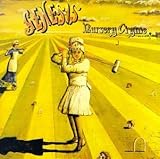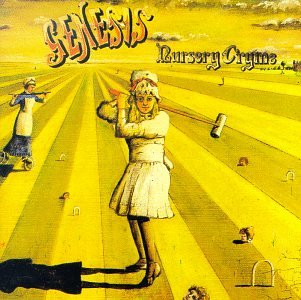Disco de Genesis: «Nursery Cryme»

- Valoración de usuarios: (4.5 de 5)
- Título:Nursery Cryme
- Fecha de publicación:1990-01-01
- Tipo:Audio CD
- Sello discográfico:Wea Int'l
- UPC:075678267321
- Media (4.5 de 5)(135 votos)
- .81 votos
- .38 votos
- .13 votos
- .3 votos
- .0 votos
- 1 The Musical Boximg 10:27
- 2For Absent Friends
- 3 The Return of the Giant Hogweedimg 8:11
- 4 Seven Stonesimg 5:11
- 5 Harold the Barrelimg 2:59
- 6Harlequin
- 7 The Fountain of Salmacisimg 7:56
Released in 1971, this is the first album with the "classic" Genesis lineup and the first to feature the distinctive ensemble sound that would characterize their work up to late 1976.
What is particularly noticeable about some of the longer pieces on this album including "The Musical Box" and "Return of the Giant Hogweed" is an aggressive and harsh sound that is largely reflected in Steve Hackett's guitar work. Although I do not know this for certain, I suspect that this heaviness may have resulted from exposure to the music of fellow Charisma label band Van der graaf Generator while on "package" tours in Britain.
One other new element that helped shape the classic Genesis sound was the addition of superb drummer Phil Collins, who brought a superior level of musicianship to the band that the previous drummer (John Mayhew) was not able to. As such, the use of unusual time signatures increased and the ensemble work became a bit more sophisticated over that found on Trespass (1970). Other interesting developments include the use of the mellotron by keyboardist Tony Banks, an instrument which is featured prominently on "Seven Stones" and the excellent "The Fountain of Salmacis", a piece that Tony wrote while studying physics at Sussex University. Quieter pieces on the album include "For Absent Friends" (which features Phil Collins on vocals) and "Harlequin", while "Harold the Barrel" is somewhere in the middle.
Interestingly enough, Tony Banks has been quoted as saying he did not feel that Nursery Cryme was much of an improvement over Trespass (1970). Although this may only hold partially true musically, conceptually and lyrically this is a completely different story. With regard to the lyrics, the cosmic and surreal imagery that would dominate the Peter Gabriel years was first expressed on Nursery Cryme. For example, "Return of the Giant Hogweed" describes (in anthropomorphic terms) how the invasive wetland plant species Heracleum mantegazziani (giant hogweed) threatens to take over the countryside. As a biologist, the thought of an invasive plant (that grows to 15-20 feet in height) shouting, "Human bodies soon will know our anger. Kill them with your Hogweed hairs!" tickled me pink.
Other bizarre imagery includes a young boy that ages suddenly, dies, and his spirit then takes up residence in a musical box belonging to his playmate. Consumed by a "lifetimes worth of desires", the spirit of "young Henry" lunges at the girl, only to have the nanny rush into the room and destroy the musical box, thus killing poor Henry.
All in all, this is a great album that initiates a four-year period where Genesis was at a creative and artistic peak. Although the production quality is somewhat muddy, and it does not possess the polish and sophistication of "Selling England by the Pound" (1973), this is still an excellent album and is recommended.
After hearing Tresspass, I didnt have very high hopes for NC. So I skipped it and got into Selling England, The Lamb and so on. Boy was I the fool. The production quality of this album really gives Genesis a distinguished sound. Also, with the appearance of Phil Collins, it makes the album that much better. The album begins with a really incredible 10 min song named The Musical Box(probably the best tune on the album). The drumming is truly intense, which keeps up with the furious guitar work. Gabriel really lets loose on this tune vocally, and helps Collins out with his old beat up bass drum. Rutherford, truly underated as a member, gives his all in this tune as for Banks who makes the tune, with his incredible talent. As for the rest of the album it can make you go from the sadest of moods with songs like, for absent friends and seven stones, to really angry moods like the freakin amazing, return of the giant hogweed, with a really heavy incredibly kicking ending. The rest cannot go unnoticed, no matter how hard you try. Its just too amazing. Especially the vocals on Harold the Barrel and the lyrically and musically beautiful, fountain of salmacis.
For those of us who were so appalled at the execrable job done on the initial CD release of this landmark 1971 album, the time has come to rejoice. This is truly a masterful remaster, with loving attention given to the sounds of the individual instruments, an awesome dynamic that makes the album sound like it was just recently recorded rather than just run through an industrial meat grinder like the last effort. The screaming guitar intro in "The Musical Box" is restored (rather than muffled under everything), brightness and overall clarity has enhanced and improved problems in the original mix (in which overmodulation had kind of mushed things together, particularly in "Giant Hogweed" and "Fountain of Salmacis"), and overall the tracks are finally afforded the respect they deserve. In places it almost sounds like new instrumentals and vocals were inserted; during the descending "aahhhs" in "Fountain" I'm hearing someone singing or playing an octave higher, absent or obscured in the original release. It's that clear. One problem, if any, with cleaning up a master recording so much is it gives the illusion of having a bit less energy since the distortion is gone. That can be solved of course by turning it up much louder.
This was the first Genesis album to feature the lineup of Peter Gabriel, Phil Collins (in his debut), Steve Hackett (also in debut), Michael Rutherford and Tony Banks. They were just bouncing back from losing 2 key members, and were apprehensive; they needn't have been. Genesis at the beginning of the 70s truly lived up to their name as the beginning of a chapter in rock, with material that was at once symphonic, dynamic and full of whimsical fantasy courtesy of the visionary Mr. Gabriel and the creative contributions of accomplished musicians. Not bad for a band that started out as guys writing songs for OTHER artists to play. This collection and its follow up, the conceptual Foxtrot (also sporting an outstanding 2008 remaster), are among the most vital additions to any serious collection of vintage progressive rock. It is so gratifying to finally hear it produced with a quality that matches the level of the music itself.
Nursery Cryme came at perhaps the most interesting time in the band's career. They had just picked up much needed muscle with Hackett and Collins, but were still trying to find their voice as a band. The result is some of the oddest, most original music they have ever composed, played at a new level of competency. For me the most fascinating progressive rock can be the strangest, and--make no mistake--Nursery Cryme is Genesis at their strangest. Here they move away from the folky tendencies of the albums that preceeded it, but are not yet producing music as streamlined and professional as that which would soon come. This is one of the most unique albums in prog rock history.
One of the best things about this album is that the ego jostling has yet to set in. Steve Hackett plays a large role and Tony Banks and Mike Rutherford sing background prominently in some places. Banks even delivers the "Mighty Hogweed" line in "Return of the Giant Hogweed," which is, by the way, a good example of a song with the bizarreness I alluded to earlier.
There are others. "Harold the Barrel" is a off-center but moving mini-opera that takes place in about three minutes, and "Seven Stones" reveals the influence that the first King Crimson album must have had on the band, especially Hackett's guitar solo in the middle and the Mellotronic thunder at the end. Kind of a creepy song in its own way. And speaking of creepy, while "The Musical Box" is an acknowledged epic masterpiece, its theme of a reincarnated (...)fixated villain is so disturbingly obscure that they had to explain the story on the liner notes of the remastered CD (whose sound IS much better than the original vinyl pressing).
The oddness of the music of this record is certainly reflected in the band's colorful stage persona at the time, all infused with a wonderful sense of artistic discovery. We know the three albums to come are the five star classics, but there is something singularly exciting about this record that you won't find anywhere else.
If i can remember correctly; Genesis' first album was done while the boys were in an England prep school in 1969. Nursery Cryme was finished in 1971, that's only 2 years out of "High School"! That's what makes this album so exceptional, I'd expect something from veteran musicians and distinguished poets and storytellers, but these are English prep boys. In some respect I would find the work Genesis did on this album to be even above those distinguished musicians and poets. I am really blown away. When they did this album they were younger than the Beatles were when they recorded SGt.Pepper. Personally I think this album's better, maybe not as revolutionary, but musically and creativly intense.

